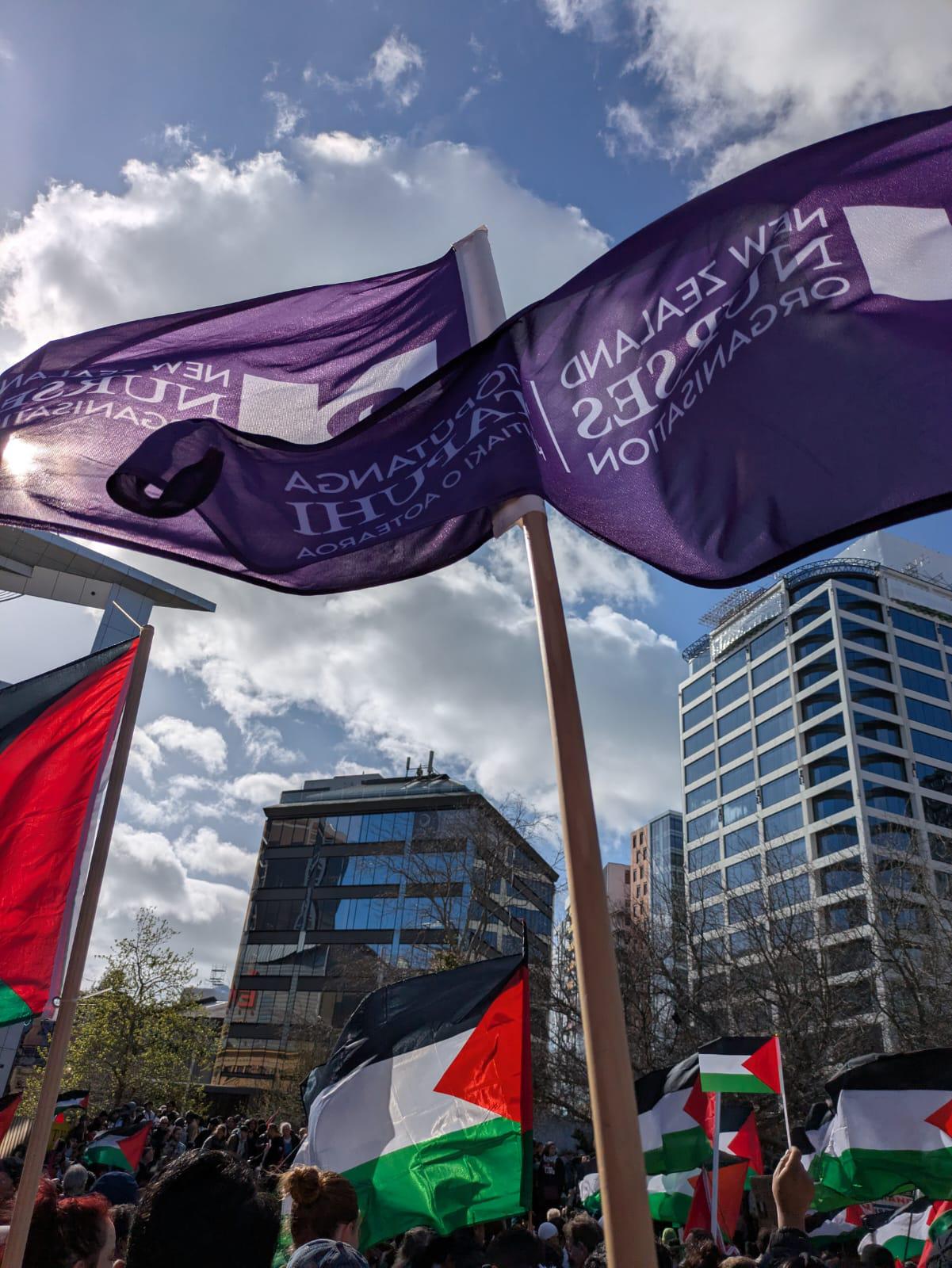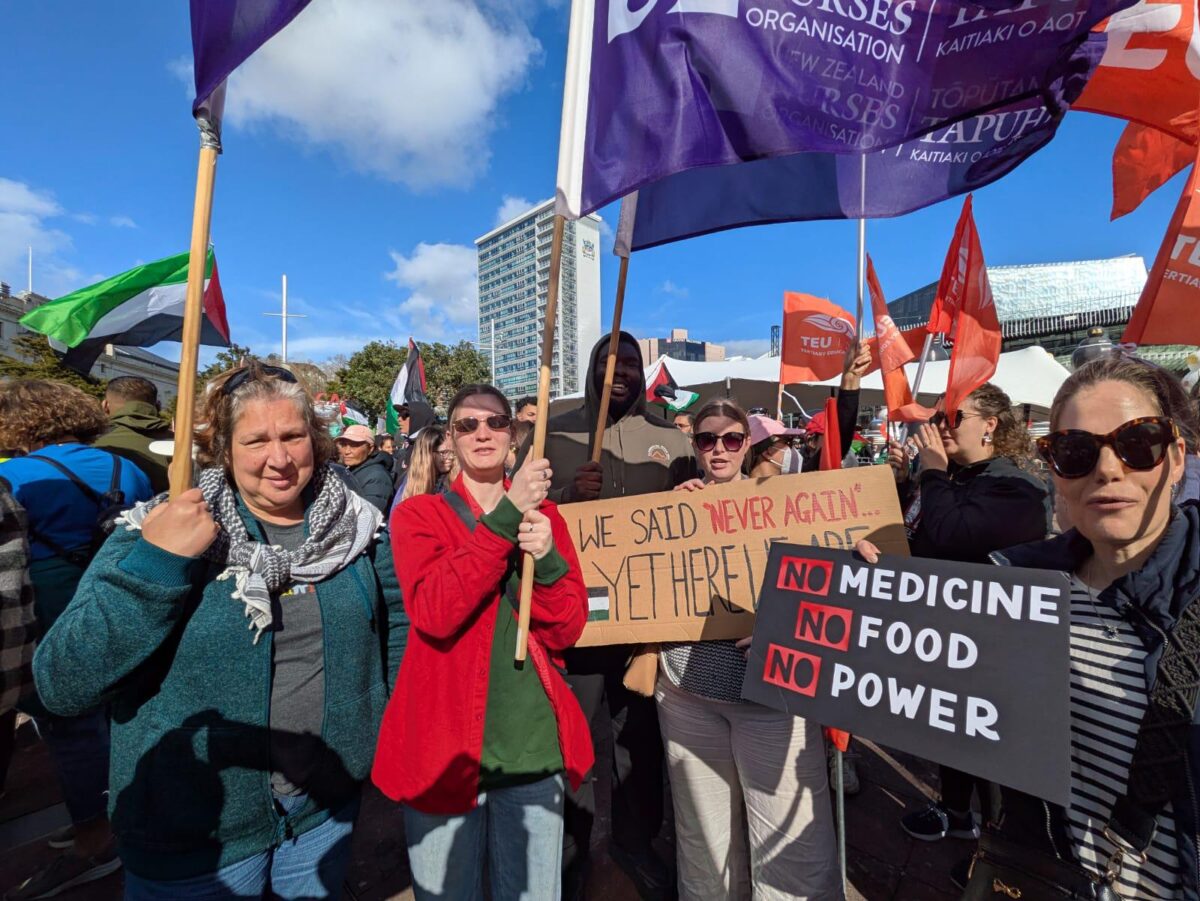There are many injustices in our world today. Throughout my life I have stood up for justice. I lend my voice to those who are voiceless, whether human or animal.
In Aotearoa, New Zealand, we have many injustices to fight: Our struggle for fair pay and safe workplaces; the 33 pay equity claims in progress that were cancelled, affecting the pay of hundreds of thousands of women; the lack of homes for all; pay that allows us to live with dignity; the life expectancy gap between Māori and non-Māori; the mental health crisis; and too many more to mention.
We, as health-care workers, are people who care, who do no harm, and who save lives.
I am sure each and every one of us has causes dear to our hearts and is prepared to speak up to improve the lives of those less fortunate. I am grateful to live in a country like Aotearoa, New Zealand, where I can exercise my right to protest, speak up, and act.
In recent months, I have become increasingly aware of the situation in Palestine.

Without claiming to be an expert on the history of the land, I can no longer ignore what I see happening before my eyes each day.
There is a military power, and there are people living on their land who are being displaced, injured, killed — and now starved. People are shot while trying to collect food. I see hospitals being bombed, and health-care workers injured and killed while caring for the sick and wounded. I can no longer reconcile this injustice with my conscience, and I feel I have a duty to speak out and act.
My reasons for being vocal now are clear. We, as health-care workers, are people who care, who do no harm, and who save lives.
I believe we must also show solidarity internationally, and for me, that means with health-care workers in occupied Palestine.
This aspiration has been stripped away from Palestinian health-care workers and from those who have come from overseas to help.
There are no more hospitals, no more supplies, no electricity. The circumstances our colleagues face are too unbearable to even imagine. As union members, we show each other solidarity — not only within our own union, but across unions in Aotearoa New Zealand.
An injury to one is an injury to all. I believe we must also show solidarity internationally, and for me, that means with health-care workers in occupied Palestine. Collectively, we can act and make a difference. The time to act is now.
At the Auckland March for Humanity, organised by the Palestine Solidarity Network Aotearoa on Saturday 13 September, where some 50,000 people gathered to demand sanctions against Israel from the New Zealand government, I saw people of all ages and from all walks of life making their voices heard. This gave me immense hope.
I joined our delegation of Tōpūtanga Tapuhui Kaitiaki o Aotearoa-NZNO members and felt a great sense of kotahitanga as I marched in protest alongside unions like PSA, TEU, PPTA, NZEI, and others.
The demands we have for the New Zealand Government are clear:
- Recognise Palestinian statehood (as 147 of 193 UN member states have already done).
- Call for an immediate ceasefire.
- Demand the unhindered entry of food, aid, and medical supplies.
- Sanction Israel for its illegal occupation of the Palestinian territories and genocidal campaign in Gaza.
In the face of the atrocities we see every day, we must heed the call of Palestinian civil society and abide by their ask of us: “boycott, divest, and sanction”.
We must stand together to condemn the genocide in Gaza. Otherwise, we become complicit.
We have a role to play. As the saying goes: Peace is union business.
— Ümit C Holland is a nurse who qualified 29 years ago in Germany and have worked in Aotearoa New Zealand for the last 23 years across Te Whatu Ora Waitematā and Te Toka Tumai in Tāmaki Makaurau Auckland.



